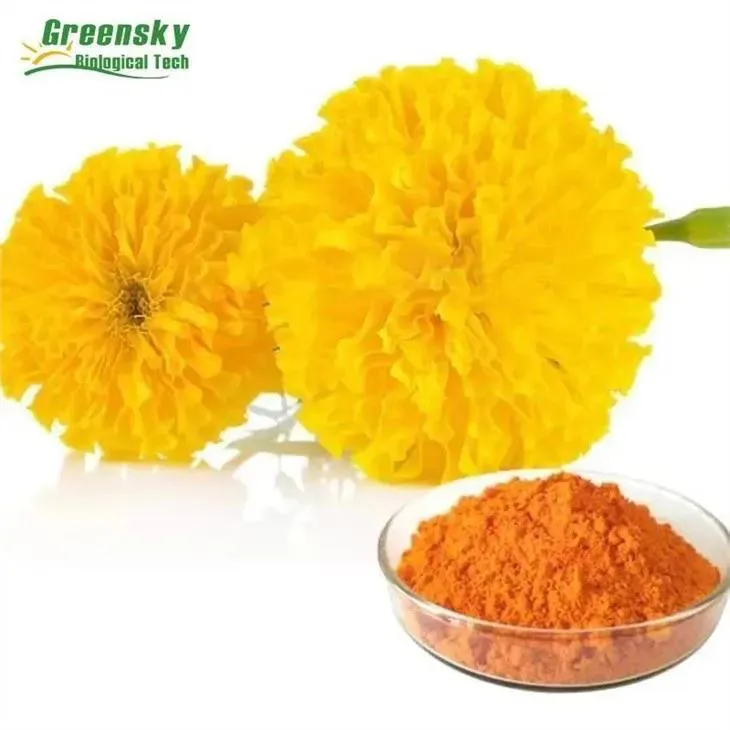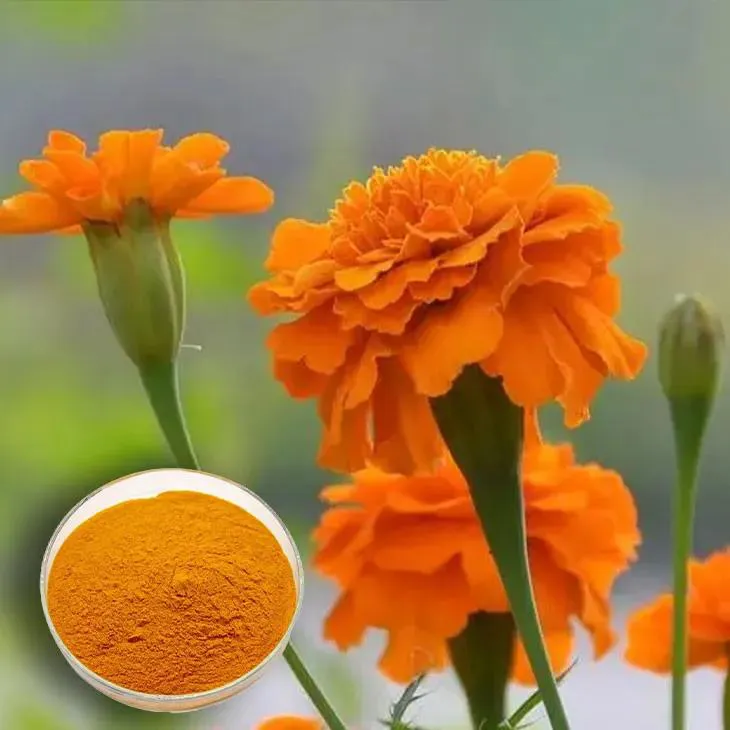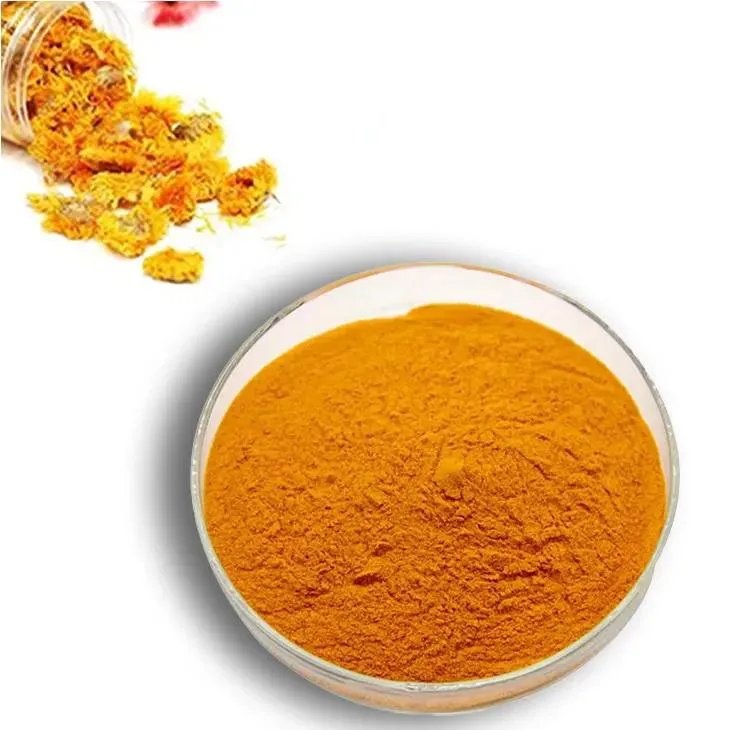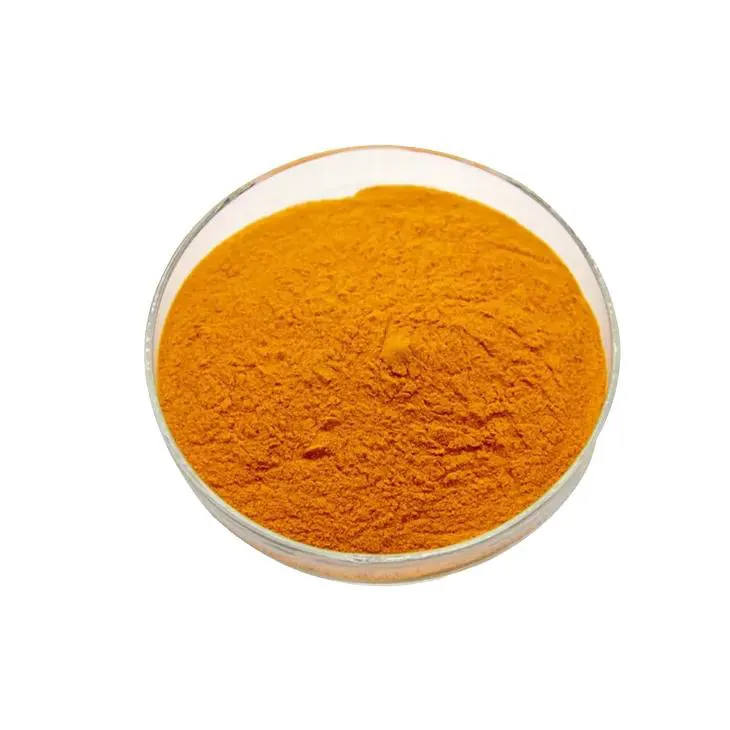- 0086-571-85302990
- sales@greenskybio.com
Purchase marigold extract in batches in an economical and efficient way.
2024-12-19

1. Introduction
Marigold Extract has gained significant popularity in various industries, including food, cosmetics, and pharmaceuticals. Its rich content of carotenoids, particularly lutein and zeaxanthin, makes it a valuable ingredient. For businesses that require large quantities of Marigold Extract, bulk buying can be a cost - efficient strategy. However, it is not without challenges. This article will explore how to obtain Marigold Extract in large volumes in a cost - efficient manner, covering aspects such as different sources, supplier negotiations, and quality control.

2. Different Sources of Marigold Extract
2.1. Natural Sources
Marigold Flowers: The most obvious natural source is the marigold flower itself. Marigolds are widely cultivated around the world, especially in regions with suitable climates. When sourcing from marigold flowers, it is important to consider the following factors:
- Cultivation Methods: Organic cultivation may be preferred in some industries, especially those targeting the health - conscious or natural - product markets. Organic marigolds are grown without the use of synthetic pesticides and fertilizers, which can potentially affect the purity of the extract.
- Geographical Origin: Different regions may produce marigolds with varying qualities. For example, marigolds grown in certain areas may have a higher content of active ingredients due to factors such as soil composition, sunlight exposure, and climate.
2.2. Synthetic Alternatives
In some cases, synthetic marigold extract or lutein/zeaxanthin analogues may be considered. However, there are several important points to note:
- Regulatory Approval: Synthetic products need to meet strict regulatory requirements, especially in industries such as food and pharmaceuticals. In some regions, there may be limitations on the use of synthetic alternatives.
- Perception in the Market: Consumers are generally more inclined towards natural products. In the cosmetics and food industries, products labeled as "natural" often have a competitive advantage. Therefore, the use of synthetic marigold extract may not be well - received in all markets.

3. Negotiating with Suppliers
3.1. Research and Selection of Suppliers
Before starting negotiations, it is crucial to research potential suppliers thoroughly.
- Reputation: Look for suppliers with a good reputation in the industry. This can be determined by reading customer reviews, industry reports, and checking for any certifications or awards they may have received.
- Production Capacity: Ensure that the supplier has the ability to meet your bulk requirements. A supplier with limited production capacity may not be able to fulfill large - scale orders in a timely manner.
- Quality Assurance: Check their quality control processes. Suppliers should have strict procedures in place to ensure the purity, potency, and safety of the marigold extract.
3.2. Pricing and Cost - Saving Strategies
When negotiating with suppliers, the price is a key factor.
- Volume Discounts: One of the most common ways to save costs is by negotiating volume discounts. The larger the quantity you order, the more leverage you have to ask for a lower price per unit. For example, if you initially order a small quantity to test the product and are satisfied, you can then approach the supplier with a larger order and request a significant discount based on the increased volume.
- Long - Term Contracts: Consider entering into a long - term contract with the supplier. This can provide stability for both parties. Suppliers may be more willing to offer lower prices in exchange for a guaranteed long - term business relationship. However, it is important to ensure that the contract includes provisions for quality control, delivery schedules, and price adjustments in case of market fluctuations.
- Bundling Products: If the supplier offers other related products, you can explore the possibility of bundling. For instance, if they also produce other plant extracts that your business may use in the future, you could negotiate a package deal that includes marigold extract along with these other products at a more favorable overall price.
3.3. Delivery and Logistics
The cost and reliability of delivery are also important aspects of the negotiation.
- Shipping Costs: Try to negotiate lower shipping costs, especially for bulk orders. Suppliers may have established relationships with shipping companies and may be able to pass on some cost savings. You can also explore options such as combined shipments if you are ordering from multiple suppliers in the same region.
- Delivery Schedules: Clearly define the delivery schedules in the contract. Delayed deliveries can disrupt your production processes or marketing plans. Ensure that the supplier has contingency plans in case of unforeseen circumstances such as natural disasters or transportation strikes.

4. Quality Control
4.1. Importance of Quality Control
Quality control is of utmost importance when purchasing marigold extract in bulk.
- Product Efficacy: In industries such as pharmaceuticals and dietary supplements, the quality of the marigold extract directly affects the efficacy of the final product. If the extract does not contain the required levels of active ingredients, such as lutein and zeaxanthin, it may not provide the expected health benefits.
- Safety for Consumers: Poor - quality marigold extract may contain contaminants such as pesticides, heavy metals, or harmful microorganisms. This can pose a risk to the health of consumers, especially in products that are ingested or applied to the skin.
- Brand Reputation: For businesses, maintaining a high - quality product is essential for building and protecting their brand reputation. A single incident of low - quality marigold extract in a product can lead to negative publicity and a loss of customer trust.
4.2. Quality Control Measures
There are several quality control measures that can be implemented:
- Testing for Active Ingredients: Regularly test the marigold extract for the presence and quantity of key active ingredients. This can be done using advanced analytical techniques such as high - performance liquid chromatography (HPLC). The results should be compared to established standards to ensure that the extract meets the required specifications.
- Contaminant Screening: Screen for contaminants such as pesticides, heavy metals, and microorganisms. This may involve laboratory tests using techniques like gas chromatography - mass spectrometry (GC - MS) for pesticide analysis and atomic absorption spectroscopy (AAS) for heavy metal detection.
- Certifications: Look for suppliers who can provide relevant certifications, such as Good Manufacturing Practice (GMP) in the pharmaceutical industry or Organic certifications for natural marigold extract. These certifications indicate that the supplier follows strict quality control procedures.

5. Market Trends
5.1. Increasing Demand
The demand for marigold extract has been steadily increasing in recent years.
- Food Industry: In the food industry, marigold extract is being used more frequently as a natural colorant and a source of antioxidants. As consumers become more health - conscious and demand cleaner labels, the use of natural ingredients like marigold extract is on the rise.
- Cosmetics Industry: In cosmetics, marigold extract is valued for its skin - soothing and anti - inflammatory properties. With the growing trend towards natural and organic beauty products, the demand for marigold extract in this sector is also increasing.
- Pharmaceutical Industry: In the pharmaceutical industry, research on the health benefits of marigold extract, particularly its role in eye health due to lutein and zeaxanthin, has led to an increased demand for high - quality extracts.
5.2. Pricing Trends
Pricing trends for marigold extract are influenced by several factors.
- Supply and Demand: As the demand for marigold extract increases, if the supply does not keep up proportionately, prices may rise. However, improvements in cultivation techniques and production processes can also increase supply and potentially stabilize or lower prices.
- Raw Material Costs: The cost of marigold flowers, which are the raw material for the extract, can impact the final price. Fluctuations in agricultural input costs, such as fertilizers and pesticides, can also affect the cost of marigold flowers and, consequently, the price of the extract.
- Competition among Suppliers: The level of competition among suppliers can also influence prices. In a highly competitive market, suppliers may be more likely to offer competitive prices to attract customers.
6. Conclusion
Bulk buying of marigold extract can be an economical and efficient strategy for businesses. By carefully considering different sources, negotiating effectively with suppliers, implementing strict quality control measures, and staying informed about market trends, companies can ensure that they obtain high - quality marigold extract at a cost - effective price. This will not only help them meet their production requirements but also enhance their competitiveness in the market.
FAQ:
Q1: What are the common sources of marigold extract?
Marigold extract can be sourced from marigold flowers directly. Some companies grow their own marigold plants specifically for extraction. Additionally, there are specialized agricultural suppliers who cultivate large quantities of marigolds for the purpose of providing raw materials for extract production. Another source can be international suppliers, especially those from regions where marigolds are grown abundantly, such as some parts of South America and Asia.
Q2: How can one negotiate better deals with marigold extract suppliers?
Firstly, it is important to do thorough market research before approaching suppliers. Knowing the current market price range gives you an edge. Then, when negotiating, be clear about your volume requirements. Larger volumes usually entitle you to better prices. You can also offer long - term contracts which provide suppliers with more stable business prospects. Another strategy is to compare different suppliers' offers and use this information during the negotiation. Point out any additional services you might need, such as packaging or delivery options, and try to get them included in the deal at a reasonable cost.
Q3: Why is quality control important when buying marigold extract in bulk?
Quality control is crucial for several reasons. Marigold extract is used in various applications such as in the food, cosmetic, and pharmaceutical industries. In the food industry, if the quality is not up to standard, it can affect the taste and safety of the product. In cosmetics, poor - quality marigold extract may not provide the desired skin benefits. In pharmaceuticals, it could impact the efficacy of drugs. Moreover, inconsistent quality can lead to problems in manufacturing processes, resulting in wasted resources and potential losses.
Q4: What are the current market trends in marigold extract?
The demand for marigold extract has been increasing in recent years. In the food industry, there is a growing trend towards using natural colorants and additives, and marigold extract is a popular choice for its natural yellow - orange color. In cosmetics, it is being used more frequently in products marketed for skin health due to its antioxidant properties. Additionally, research on the potential health benefits of marigold extract in the pharmaceutical field is also driving the market. However, supply can be affected by factors such as weather conditions in major growing regions and changes in agricultural practices.
Q5: What factors should be considered for an economical bulk purchase of marigold extract?
When aiming for an economical bulk purchase of marigold extract, consider the following factors. The price per unit volume is of course a key factor, but also look at the quality - price ratio. Don't sacrifice quality for a lower price as it may cost more in the long run. Transportation costs should be considered, especially if the supplier is far away. Packaging costs and requirements also play a role. Another factor is the reliability of the supplier. A supplier with a good reputation for on - time delivery and consistent quality can save you potential losses due to delays or sub - standard products.
Related literature
- Marigold Extract: Production and Applications"
- "The Economics of Bulk Purchasing of Botanical Extracts, with a Focus on Marigold"
- "Quality Control in Marigold Extract Production for Different Industries"
- ▶ Hesperidin
- ▶ Citrus Bioflavonoids
- ▶ Plant Extract
- ▶ lycopene
- ▶ Diosmin
- ▶ Grape seed extract
- ▶ Sea buckthorn Juice Powder
- ▶ Fruit Juice Powder
- ▶ Hops Extract
- ▶ Artichoke Extract
- ▶ Mushroom extract
- ▶ Astaxanthin
- ▶ Green Tea Extract
- ▶ Curcumin
- ▶ Horse Chestnut Extract
- ▶ Other Product
- ▶ Boswellia Serrata Extract
- ▶ Resveratrol
- ▶ Marigold Extract
- ▶ Grape Leaf Extract
- ▶ New Product
- ▶ Aminolevulinic acid
- ▶ Cranberry Extract
- ▶ Red Yeast Rice
- ▶ Red Wine Extract
-
Baicalin
2024-12-19
-
Cactus Extract
2024-12-19
-
Black Pepper Extract
2024-12-19
-
Nettle Root Extract
2024-12-19
-
Withania Somnifera Extract
2024-12-19
-
Saffron Extract Powder
2024-12-19
-
Beetroot Powder
2024-12-19
-
Buckthorn bark extract
2024-12-19
-
Chasteberry Extract
2024-12-19
-
Coconut Water Powder
2024-12-19





















